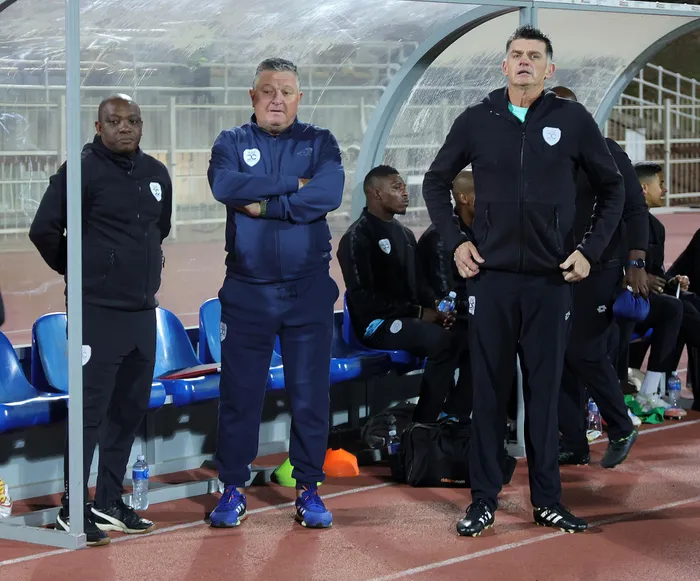
The Durban City braintrust of assistant coach Pitso Dladla, from left, head coach Gavin Hunt, and goalkeeper coach Rowen Fernandez will arguably target cup success over a league challenge this season. Photo: Backpagepix
Image: Backpagepix
KwaZulu-Natal football has been waiting more than a decade for silverware, and Durban City assistant coach Pitso Dladla believes the region’s struggles are rooted in financial realities and player retention.
The last major trophy to land in KZN was back in 2009 when Golden Arrows stunned Ajax Cape Town to lift the MTN8. Before that, the only league success from the province came courtesy of Manning Rangers in 1997, a club that has since folded.
AmaZulu have come the closest to rewriting that history in recent years, finishing runners-up in the 2020/21 league campaign and reaching the MTN8 final in 2022, only to fall short on both occasions.
Dladla, who is part of Gavin Hunt’s technical team at newly promoted Durban City, says cup competitions offer the most realistic route for clubs in the province.
“Winning cup competitions is very possible because you only play a handful of matches and if you plan well, you might be able to win it,” Dladla said last week on Ukhozi FM.
While cups can be won on good planning and a well-timed run, the league, he argues, requires deeper resources and a squad that can be sustained across nine months.
“With regards to the league, there’s a lot of challenges that come up when you’re competing for the league. Most teams that win the league are teams that have been built over various years,” he explained.
The assistant coach pointed to the financial gulf between KZN outfits and the traditional heavyweights from Gauteng as a stumbling block that is difficult to overcome.
“The challenge for our clubs or teams like us is that we don’t have the financial muscle. We build but whilst we’re building, more financially savvy clubs take those players and therefore we have to restart the entire process whilst other teams win titles.”
KZN clubs have produced a steady stream of talent over the years, but many of those players are quickly snapped up by bigger teams.
From Siyabonga Nomvethe’s move to Chiefs in the late 1990s to more recent cases like Yanela Mbuthuma and Nkosikhona Ndaba joining the Sea Robbers, the trend continues to rob the province of continuity.
Dladla believes that unless clubs in the region make a deliberate choice to resist selling, the cycle will remain unbroken.
“Maybe if KZN clubs decide to put a halt on selling players for one or two seasons, we might be able to steal a league title somewhere there but for as long as we sell players, it becomes nearly impossible,” he added.
For now, the wait for silverware drags on. Richards Bay remain the province’s only topflight representatives alongside AmaZulu and newcomers Durban City, but the challenge of bridging the gap with the country’s elite persists.
Dladla’s words serve as a reminder that while KwaZulu-Natal continues to produce competitive sides, the step from challengers to champions requires more than ambition — it demands long-term planning, financial stability and, above all, the ability to keep hold of their best players.
Related Topics: